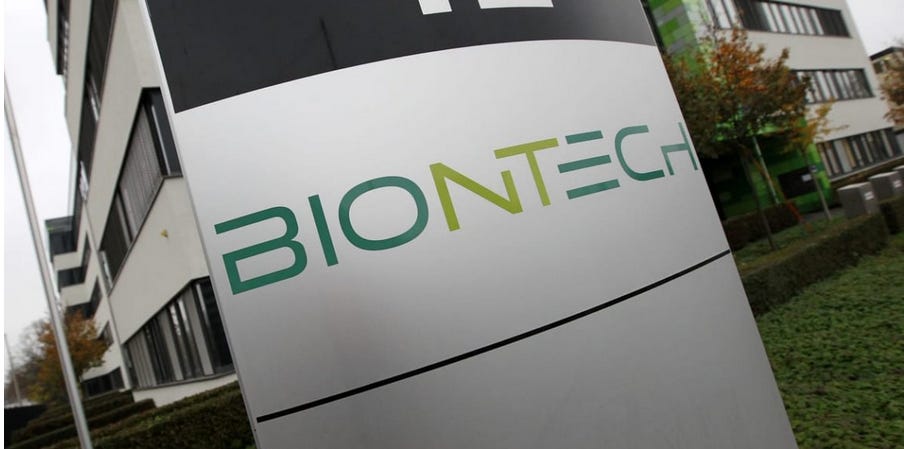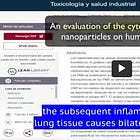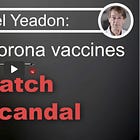Robert Kogon: Did BioNTech’s Experimental Cancer Drugs Promote Cancer? The Plot Thickens
Prior to the advent of COVID-19, BioNTech, the German developer and owner of the so-called ‘Pfizer’ vaccine, had only ever done trials for cancer therapies.
One-time or recurring donations can be made through Ko-Fi:
By Robert Kogon April 18, 2024
Prior to the advent of COVID-19, BioNTech, the German developer and owner of the so-called ‘Pfizer’ vaccine, had only ever done trials for cancer therapies. This was the company’s focus, not infectious diseases.
But none of those trials got very far. None of BioNTech’s experimental cancer drugs had ever made it to a large-scale phase 3 clinical trial, and one of the just three phase 2 trials registered by BioNTech prior to 2020 was “prematurely ended” for unknown reasons. All in all, BioNTech had only tested its drugs on just over 400 – for the most part, extremely-ill – cancer patients.
In light of reports of surging cancer diagnoses since the rollout of the mRNA-based Covid vaccines, I wondered in a recent article whether BioNTech’s trials faltered because its mRNA-based cancer therapies were in fact promoting cancerous growths rather than inhibiting or reversing them.
Well, now we have further support for this hypothesis.
A new preprint by Rubio-Casillas et al. in the International Journal of Biological Macromolecules asks ‘N1-methyl-pseudouridine (m1Ψ): Friend or foe of cancer?‘ Substituting N1-methyl-pseudouridine for naturally occurring uridine is precisely the innovation at the heart of BioNTech’s mRNA platform, which is thus, in reality, a modRNA or modified RNA platform. Katalin Karikó, who would go on to become a BioNTech Vice-President, shared the Nobel Prize in Medicine with Drew Weissman for having discovered this innovation.
N1-methyl-pseudouridine: friend or foe of cancer? The authors’ answer is clear: friend… of cancer. Thus, the abstract reads (emphasis added):
Additionally, it has been discovered that the mRNA vaccines inhibit essential immunological pathways, thus impairing early interferon signaling. … Evidence is provided that adding 100 % of N1-methyl-pseudouridine (m1Ψ) to the mRNA vaccine in a melanoma model stimulated cancer growth and metastasis, while non-modified mRNA vaccines induced opposite results, thus suggesting that COVID-19 mRNA vaccines could aid cancer development.
Did BioNTech and the regulatory authority already know what Rubio-Casillas et al. found out? This is to say: did they know that the company’s mRNA platform could be oncogenic before the platform was rolled out to literally billions of people around the world as the basis of its COVID-19 vaccine?
The competent regulatory authority for two of the trials, including the one that was “prematurely ended”, was none other than the PEI: Germany’s vaccines and medicines regulator, whose cozy relationship with BioNTech I have written about here. (The competent authority for the third trial was Germany’s Federal Institute for Drugs and Medical Devices (BfArM), a sister organisation of the PEI.)
As noted in my previous article on the subject, thanks to an American FOIA request and a court order, we have a virtually complete record of the clinical trials of BioNTech’s COVID-19 vaccine. These are the ‘Pfizer documents’ – a misnomer, since Pfizer merely conducted the trials on the German company’s behalf – which the FDA famously wanted to keep hidden for some 75 years.
Why should we not have just as complete a documentary record of BioNTech’s earlier cancer trials? The public interest is obvious, not just for Germany but indeed for almost the entire world. Germany’s relatively young freedom of information law needs to be tested. But if BioNTech did indeed detect a signal that its cancer drugs were promoting cancer, the PEI might well want to hide the documents not just for 75 years, but forever.
Source: dailysceptic.org
Related articles:














Yep, we had to assure the cancer causing potential of our additive before we could get it even considered for a vaccine.
Pretty much what happened.
Inside Pharma wrote in Jan 24 that the CAR T gene therapy trials, i.e. vaccines, require black box warnings, as one brand showed trial subjects developing new cancers in totally different areas. I just started reading Kristi Yapp's stack, relaying diary entries of her mother's and her journey with Turbo cancer. She went to hospital with extremely painful and swollen lymph node in groin, making walking impossible. Turns out pancreas cells found in groin and no tumour in pancreas. Her diary is a hard read with insights and reflections on life. Her mum has the most beautiful smile too, and a strong Christian faith. Two other different cancers found in addition.